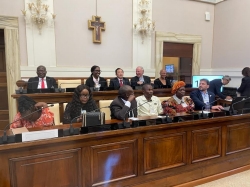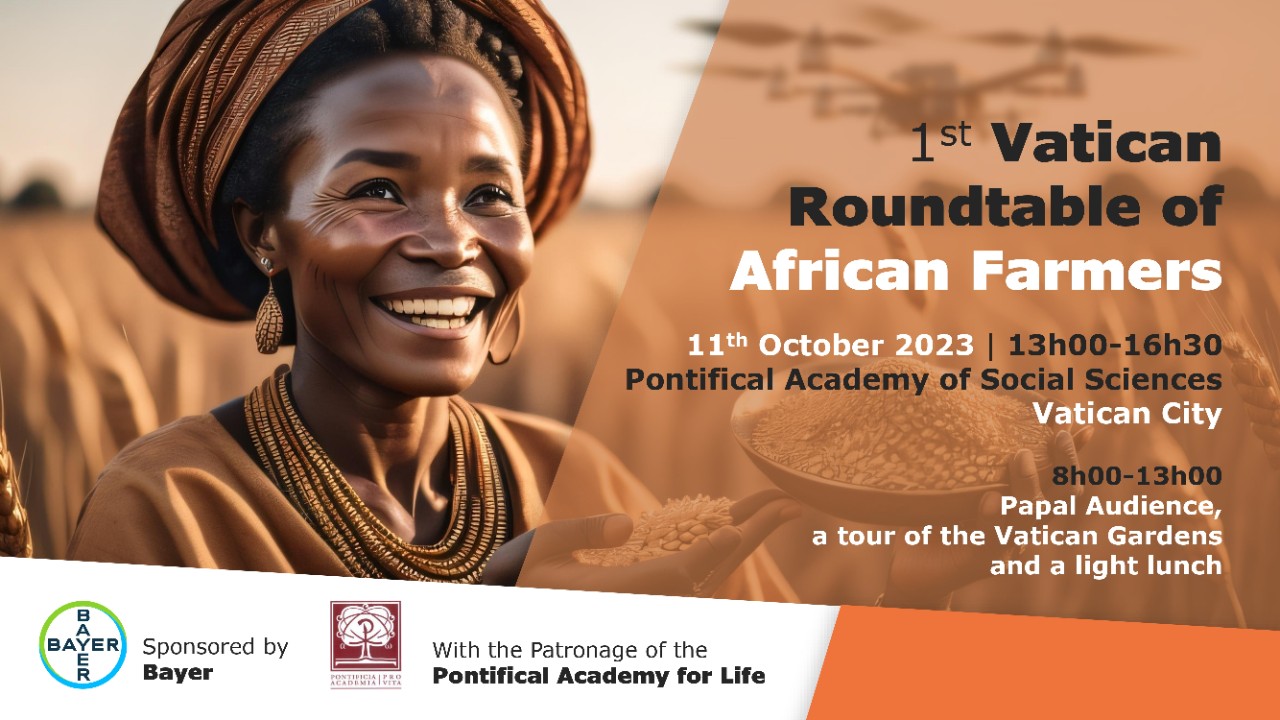Roundtable of African Farmers - Final Statement

PRESS RELEASE
First Roundtable of African Farmers at the Pontifical Academy of Sciences
African farmers are calling for outcome-driven, technology-open and evidence-based agricultural policies
Farmers from Kenya, Malawi, Nigeria, Sierra Leone, and Zimbabwe discussed key challenges and opportunities for agriculture in Africa at the first Roundtable of African Farmers which took place at the Pontifical Academy of Sciences in Vatican City on Wednesday, October 11th.
The event, sponsored by Bayer with the patronage of the Pontifical Academy for Life, represented an important moment to put at the center the voice of those who are at the forefront of agricultural production but who often find themselves relegated to the back row in global debates on agricultural development. As Mildred Nadah Pita, Head of Public Affairs, Science and Sustainability at Bayer for Africa, highlighted, it is crucial to learn and understand from farmers what their “pain points are, what opportunities they see and how together we can find lasting solutions to their challenges."
Diplomats from Africa and other regions, representatives of FAO and IFAD, research institutions, civil society organizations and the private sector gathered to listen and interact with the speakers.
Agriculture sustains more than 50% of Africa’s population, and it accounts for 35% of Africa's GDP, reaching 50-60% in some nations. Still, the continent is struggling to secure food supply for millions of people. The FAO estimated that rainfed crop area in the continent has the potential to be expanded by 150-700%. But such potential is constrained by “limited access to modern technologies, finances, and farming education, alongside land tenure and access issues, inadequate infrastructure, and climate adversities”, as pointed out by the farmers.
Prof. Eric Danquah – World Agriculture Prize and Africa Food Prize laurate – in his impactful keynote speech spotlighted a multi-pronged strategy essential for transforming the continent’s agricultural sector, including a robust focus on the development of staple crops, revitalizing agricultural education, fostering strategic public-private partnerships, empowering farmers with knowledge and skills, harmonizing policies for agricultural growth, and, crucially, amplifying political commitment from African governments.
“Africa is unfortunately not on track to meet the global goals on food security and nutrition set out in the 2030 Agenda, nor the goals of the Malabo Declaration agreed to by Members of the African Union”, said Dr QU Dongyu, FAO Director-General, in his opening remarks, then adding: “Science, innovation and technologies can deliver great potential. We must ensure that it is accessible for everyone.”
By focusing on access to technologies enabling “farmers to drive a socially, economically, and environmentally sustainable agriculture, and contribute to the enhancement of food security and the overall development of the region”, the farmers recommended policies “that are focused on outcomes, open towards technologies and practices, and based on scientific evidence.”
· Outcome-Driven
Farming practices and technologies must be aimed at delivering against a set of key outcomes that are desirable in relation to their impact on farmers, environment, and consumers. Such outcomes should include amongst others the increase of productivity of farms, the improvement of livelihoods, the preservation and restorement of soil health, natural habitats, biodiversity and water resources as well as the reduction of greenhouse gas emissions from agriculture and increased resilience to climate change. With regard to consumers, it is important to ensure food safety and enhance nutrition.
· Technology-Neutral
Policies should neither allow nor prohibit specific agricultural technologies and practices, nor should they favor one over another. Remaining open and neutral, policies will nurture a diversified technological ecosystem, enhancing farmers’ adaptability and resiliency to local conditions by giving them access to all the tools in the toolbox – be them traditional, modern, organic, biotechnology, biological, chemical, biochemical, mechanical, or digital tools – to implement locally tailored and flexible solutions.
· Evidence-Based
Policies should enable the expedited legal approval and registration for the development, availability, accessibility, use, and scaling up of all those technologies that – based on scientific evidence gained through testing and implementation in diverse agroecological and socio-economic contexts – have proven to successfully enable farmers to deliver against the desired outcomes, while minimizing trade-offs and maximizing synergies among them.
“Farmers gave us the elements of sustainable agricultural practices that are based on social justice and environmental sustainability“, said Ambassador Nosipho Jezile, Permanent Representative of South Africa to the UN Rome-Based Agencies and Chairperson of the Africa Group in Rome, highlighting that “their recommendations are helping us with a menu in that respect.“
Encapsulating the day’s discussions, Mons. Renzo Pegoraro, Chancellor of the Pontifical Academy for Life highlighted three key elements: “First, agricultural development must be sustainable from a socio-economic and environmental point of view; second, the need for adequate training for all agricultural stakeholders; third, the importance of supporting farmers, young people, and women, with particular focus on small scale farms, offering employment opportunities, human and professional growth, respecting the dignity of people and local realities.”
Concluding with Ambassador Jezile‘s inspiring words: „We need each other, we need the farmers, we need ourselves and our governments, we need the private sector and we need the institution like the Pontifical Academy to hold hands in order to deal with the challenges of our time.“








